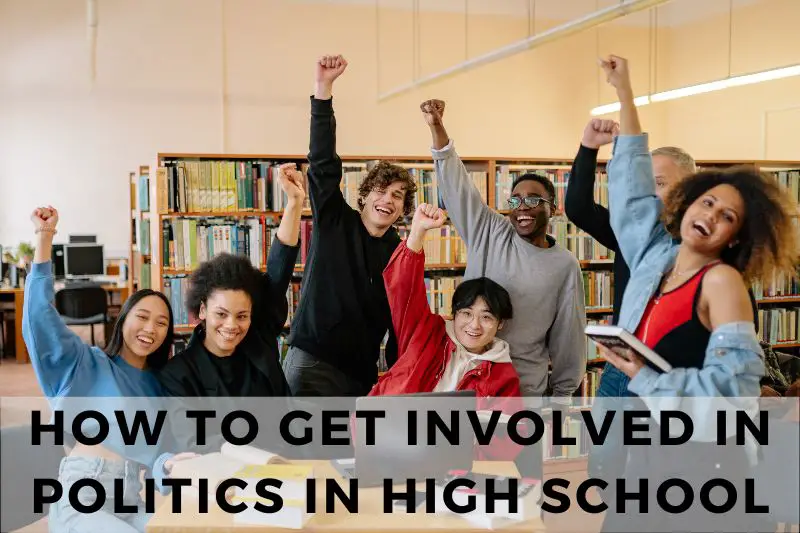
Getting involved in politics as a high school student might seem daunting, but it’s an empowering way to make your voice heard and shape the future of your community. Whether you’re passionate about specific issues or simply curious about how government works, there are plenty of opportunities to get involved and make a difference. This guide outlines practical ways you can engage in politics while balancing your academic and personal life, helping you build valuable skills and experience for the future.
How to Get Involved in Politics While Still in High School
#1. Join a High School Government or Student Council
One of the easiest ways to get started in politics is by joining your high school’s student government or council. These organizations often mimic the structures of real governments, giving you firsthand experience in leadership, decision-making, and problem-solving. Whether you’re elected as a representative or involved in planning events, you’ll learn to collaborate with peers, address school-wide concerns, and communicate with faculty and administrators. Plus, this experience can strengthen your resume and college applications.
#2. Volunteer for Local Political Campaigns
Political campaigns are always in need of enthusiastic volunteers, and high school students can play a vital role in these efforts. Tasks might include canvassing neighborhoods, making phone calls, distributing flyers, or assisting with social media outreach. Volunteering for a campaign helps you understand how elections work and exposes you to different aspects of political strategy. Additionally, you’ll connect with influential people in your community, which can lead to valuable mentorship opportunities.
#3. Start or Join a Political Club at School
If your school doesn’t already have a political club, consider starting one! Political clubs allow students with similar interests to come together to discuss current events, host guest speakers, and plan initiatives like voter registration drives. These groups can be nonpartisan or aligned with specific political ideologies, depending on your interests. Being part of such a club fosters critical thinking, debate skills, and a deeper understanding of political issues.
#4. Attend Local Government Meetings or Town Halls
Many local government meetings and town halls are open to the public, making them excellent opportunities to learn about local politics. Attend these gatherings to hear about issues affecting your community, ask questions, and share your opinions. Participating in these events demonstrates civic engagement and can inspire you to take action on topics that matter to you.
#5. Engage in Mock Elections and Debates
Mock elections and debates provide a fun, educational way to explore the electoral process and practice public speaking. Schools often organize these events around national elections, but you can also initiate them with your classmates. These activities encourage you to research candidates and policies, form arguments, and develop persuasive communication skills—all essential tools for future political involvement.
#6. Intern for Local Politicians or Nonprofits
Internships with local politicians or nonprofit organizations offer hands-on experience in the political and civic sectors. As an intern, you might assist with research, help organize events, or manage communications. These experiences provide invaluable insights into how government and advocacy work while allowing you to contribute to meaningful causes.
#7. Organize or Participate in Community Service Projects
Community service is a powerful way to address local issues and make a tangible impact. Organize clean-ups, food drives, or fundraising events for causes you care about. These projects not only improve your community but also demonstrate leadership and initiative, which are crucial qualities in the political realm.
#8. Advocate for Change through Petitions or Awareness Campaigns
If there’s an issue you’re passionate about, consider starting a petition or launching an awareness campaign. Whether it’s advocating for environmental sustainability or pushing for changes in school policy, these efforts can mobilize support and bring attention to important causes. Platforms like Change.org make it easy to start petitions and reach a broad audience.
#9. Write for a School Newspaper on Political Issues
Writing for your school newspaper is a great way to share your political insights and inform your peers. Covering topics such as local elections, global events, or school policies allows you to develop research and writing skills while fostering informed discussions within your community.
#10. Participate in Youth Leadership Programs
Youth leadership programs, such as those offered by civic organizations or nonprofits, are designed to train the next generation of leaders. These programs often include workshops, mentorship opportunities, and even trips to government institutions. Participating in such initiatives allows you to connect with like-minded peers, gain practical knowledge, and expand your network.
Conclusion
Getting involved in politics while still in high school is not only possible, but it’s also a great way to develop important skills, make meaningful connections, and influence your community. Whether you’re leading a student council campaign, volunteering on a political campaign, or starting a community service project, every action you take helps build a foundation for a future in politics or public service.
The earlier you start, the more opportunities you’ll have to grow as a leader and advocate for change. So, take the first step today—get involved, stay informed, and become a voice for the issues that matter to you and your community.
